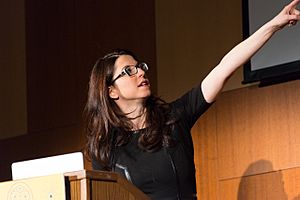Heather Berlin facts for kids
Quick facts for kids
Heather Berlin
|
|
|---|---|

Berlin in 2014
|
|
| Born |
Heather A. Berlin
New York, New York, U.S.
|
| Other names | Heather Berlin |
| Alma mater | Magdalen College, University of Oxford (DPhil) Harvard University (MPH) |
| Spouse(s) | Baba Brinkman (2013-2024) |
| Awards | Young Investigator Award American Neuropsychiatric Association Clifford Yorke Prize International Neuropsychoanalysis Society |
| Scientific career | |
| Fields | Neuroscience Psychology Science Communication |
| Institutions | Icahn School of Medicine at Mount Sinai New York Presbyterian Hospital Weill Cornell Medicine |
| Thesis | Impulsivity, the orbitofrontal cortex and borderline personality disorder (2003) |
| Doctoral advisors | Susan Iversen Edmund Rolls |
Heather A. Berlin is an American neuroscientist and a licensed clinical psychologist. She is well-known for explaining science to the public. Her work focuses on how the brain affects our behavior. She studies how to prevent and treat problems like being too impulsive or having strong worries. Dr. Berlin is also interested in how our brains create thoughts and ideas, and how we can be creative.
You might have seen her on TV! She hosts the PBS show Your Brain (part of the Nova series). She also hosted Science Goes to the Movies on PBS, Superhuman Showdown on the Discovery Channel, and StarTalk All-Stars with Neil DeGrasse Tyson.
Contents
About Her Early Life and Studies
Heather Berlin grew up in New York. As a child, she was very curious about the brain. She often wondered about how we think and what makes us who we are.
Dr. Berlin studied at some amazing universities. She earned her doctorate degree in experimental psychology and neuropsychology from Magdalen College at the University of Oxford. This means she studied how the brain works and how it affects our behavior. She also got a Master of Public Health from Harvard University. There, she learned about mental health issues in large groups of people. She also studied how to manage healthcare. Before that, she earned her first degree from SUNY Stony Brook. She also completed special training in psychiatry and neuropsychology at places like the Icahn School of Medicine at Mount Sinai.
Her Work and Brain Research
Dr. Berlin has spent a lot of time teaching about the brain. She teaches in the United States and in other countries. Currently, she is a professor of Psychiatry and Neuroscience at the Icahn School of Medicine at Mount Sinai. She has also taught at the Hebrew University of Jerusalem in Israel.
As both a psychologist and a brain scientist, Dr. Berlin does two main things. She helps patients in her private practice. She also does research to understand the brain better. When she helps patients, she focuses on their overall well-being. She wants to help them feel better and live healthier lives.
In her research, Dr. Berlin studies how the brain works when people have problems with being too impulsive or having strong worries. She also explores how our brains create consciousness and creativity. She often uses special brain scans, like fMRI and Diffusion Tensor Imaging (DTI). These scans help her see what parts of the brain are active. She has also worked on studies using Deep Brain Stimulation (DBS). This is a treatment for very severe obsessive-compulsive disorder (OCD). OCD is a condition where people have unwanted thoughts and feel they must repeat certain actions.
Dr. Berlin is very passionate about sharing science with everyone. She also works to help people understand mental health better. She wants to encourage more women to study science, technology, engineering, and math (STEM). She is part of important groups like the National Academy of Sciences. These groups help connect science with the public.
She has also been part of stage shows. She co-wrote and starred in Off the Top. This show was about how the brain works during improvisation. She also performed in Impulse Control. Dr. Berlin has appeared on many TV shows and podcasts. These include the History Channel, Netflix (like The Mind, Explained), BBC World Service, and StarTalk Radio with Neil deGrasse Tyson.
Awards and Special Recognitions
Dr. Berlin has received many awards for her important work. These include the Young Investigator Award from the American Neuropsychiatric Association. She also won the Clifford Yorke Prize from the International Neuropsychoanalysis Society. She even won the BBC's Christmas University Challenge as part of her team from Magdalen College, Oxford.
Personal Life
Heather Berlin has a daughter, born in November 2013, and a son, born in November 2016. Their father is Baba Brinkman. He is a rap artist and also helps explain science to people.

